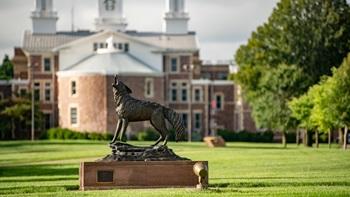Saving the World With AI
USD Student Nicholas Rasmussen Experiments with Artificial Intelligence (AI) to Solve Timely Problems

Nicholas Rasmussen, a junior computer science major and a recipient of the 2021/2022 Undergraduate Research Award, uses big data and machine learning to solve a variety of problems, including tracking criminals and detecting COVID-19.
Originally from Vermillion, South Dakota, Rasmussen has worked as a researcher for the University of South Dakota in multiple capacities. In the spring of 2021, he was hired as a research assistant for the Department of Computer Science to study data science and machine learning.
One of Rasmussen’s projects is on footwear impression evidence verification. AI-guided tools can extract distinguish features in shoe prints to help law enforcement better track criminals at the crime scene. His project explored the use of a neural network called “U-Net” to process and compare the shoe prints in the big database.
“This research, with proper refinement, has the potential to create super detectives that can utilize AI in the field while ‘the trail is hot,’ helping to track more criminals before they can go into hiding,” Rasmussen said.
Rasmussen’s second project is studying cough sounds for the presence of COVID-19. Cough is frequently presented as one of the most common symptoms for COVID-19 patients regardless of multiple factors, such as socio-demographics, age and severity of the illness.
“Humanity faces many problems, both natural like COVID-19, and manmade like criminal activity,” Rasmussen said. “With my projects, I feel like I get to try to save the world, all while having fun and experimenting.”
Rasmussen has co-authored two research articles that are under peer review. He was selected as a National Science Foundation-Research Experience for Undergraduates (NSF-REU) student in the summer of 2021.
Rasmussen plans to continue to do research, and after graduation, he hopes to get a job as a data scientist where he can research and experiment with AI algorithms.
Originally from Vermillion, South Dakota, Rasmussen has worked as a researcher for the University of South Dakota in multiple capacities. In the spring of 2021, he was hired as a research assistant for the Department of Computer Science to study data science and machine learning.
One of Rasmussen’s projects is on footwear impression evidence verification. AI-guided tools can extract distinguish features in shoe prints to help law enforcement better track criminals at the crime scene. His project explored the use of a neural network called “U-Net” to process and compare the shoe prints in the big database.
“This research, with proper refinement, has the potential to create super detectives that can utilize AI in the field while ‘the trail is hot,’ helping to track more criminals before they can go into hiding,” Rasmussen said.
Rasmussen’s second project is studying cough sounds for the presence of COVID-19. Cough is frequently presented as one of the most common symptoms for COVID-19 patients regardless of multiple factors, such as socio-demographics, age and severity of the illness.
“Humanity faces many problems, both natural like COVID-19, and manmade like criminal activity,” Rasmussen said. “With my projects, I feel like I get to try to save the world, all while having fun and experimenting.”
Rasmussen has co-authored two research articles that are under peer review. He was selected as a National Science Foundation-Research Experience for Undergraduates (NSF-REU) student in the summer of 2021.
Rasmussen plans to continue to do research, and after graduation, he hopes to get a job as a data scientist where he can research and experiment with AI algorithms.



